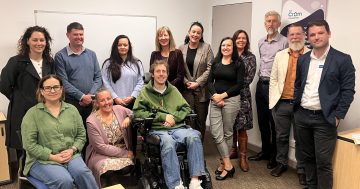
Ellen Noye from Solve Care wants to see NDIS participants and their providers looked after. Photo: Supplied.
Illawarra National Disability Insurance Scheme (NDIS) providers are grappling with system errors from the National Disability Insurance Agency (NDIA), with some being advised to leave participants in hospitals if funding is cut.
For Solve Care managing director Ellen Noye, that’s unacceptable, instead leaving her organisation and others footing bills in the hundreds of thousands.
While NDIS reforms have kicked in to clean up the system, Ellen said some providers were living with errors caused before the changes.
As an NDIS-registered disability support service provider dedicated to offering assistance in daily living through to allied health services, Solve Care has found itself with a more than $95,000 debt after choosing to support a participant whose NDIS funding wasn’t sufficient.
Ellen said they were providing essential supports for a participant whose allied health team recommended 20 hours of one-to-one support per day, but funding allocated was limited to just six hours daily.
“She was going for plan reviews every six to seven months, which they were going through successfully,” she said.
“Then the NDIS reforms came in and there was short staffing, a lot of changes within the NDIA, and they were unable to meet their requirements.
“They let this continue on where a participant is using their funds too quickly, and they just kept renewing the same plan.
“Unfortunately, providers cannot access detailed plans or funding through a portal, which complicates our ability to effectively manage support agreements under the participant’s choice and control.”
Ellen said the participant’s coordinator of supports (COS) then submitted a change of circumstance request due to a severe injury that resulted in a new physical disability, alongside chronic mental health issues.
“This participant was reliant on our supports to avoid hospitalisation, as a cessation of services would have left them unable to manage daily living activities,” she said.
Ellen said leaving participants in hospitals was the “unspoken suggestion” when asking support coordinators, advocacies or other parties what to do with a patient unable to access funds.
“Providers are being instructed to leave participants in hospitals if support funding is withdrawn, which is unacceptable for our participants,” she said.
“Ultimately, we want to shed light on the invaluable work being done by providers within the NDIS framework and how the service delivery failures are impacting our ability to provide quality services.
“If this situation persists, we risk losing many registered providers, as debts exceeding $100,000 are commonplace across the industry.”
Ellen said she knew of multiple providers with debts up to $250,000 as they worked with supported independent living participants who required assistance to remain in the community and live independently.
“There’s participants with severe dementia who become a little bit aggressive, their partners or informal supports can’t care for them anymore, so they go into supported independent living where there’s professionals that care for them,” she said.
“The NDIA are failing to keep up with their requirements for planning and management of funds, so these people are left with quite huge debts, which don’t actually ever get resolved.
“There’s meant to be a pathway through their payment inquiries team, however, we’ve waited over seven months just to hear a response from them.”
Ellen said the delays were three times more than what they recommend on their website and reports, which was leaving participants in these situations.
“Providers are the ones suffering the consequences, which will lead to quality providers leaving the industry, which is quite sad,” she said.
Ellen said she knew of a few businesses that had folded, while others were reducing their overheads or taking on the costs themselves.
Solve Care has chosen to pursue recouping the more than $95,000 owed for services rendered, with payment inquiries dating back to 4 July, 2023.
“Our first response from the NDIA payments team was received in February 2024 – over seven months later,” Ellen said.
She said while ongoing advocacy efforts – including communications with government ministers, Illawarra Advocacy, the NDIS Commission and the NDIA – had resulted in the participant finally being funded the 20 hours a day, the debt remained unresolved more than a year later and the NDIA refused to review its decision.
“As providers, we find ourselves without further avenues to challenge these decisions as the NDIA is not subject to any review process concerning their determinations affecting providers,” she said.
“At this point, generally after a year of having a debt, they say that it’s not recoverable.”
Ellen said she was now seeking legal advice.
“Overall, we just want to ensure participants are well supported and that these reforms are suited to participant needs to make sure there’s no shortfalls and that providers have avenues for support, so that these financial burdens aren’t placed on good providers,” she said.
An NDIA spokesperson said the NDIA’s priority was ensuring participants received the disability-related supports they needed, with average plan budgets having increased by 7.5 per cent across all participants over the two-year period to 30 June, 2024.
“Participants, and their providers, are required to ensure they spend their plans in line with the duration of their plan, unless otherwise approved by the NDIA,” the spokesperson said.
“While the agency can and does act in circumstances to prioritise plan reassessments for participants at risk, the NDIS is not a crisis service.
“The NDIS was designed to complement, not replace, mainstream supports, such as health for personal injury or mental health for episodic needs, which remain the responsibility of state and territory governments.”


















